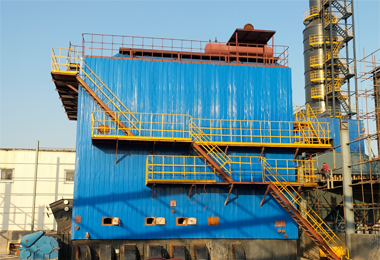
ຕ.ລ. . 01, 2024 06:55 Back to list
Understanding the Definition and Function of Steam Boilers in Industrial Applications
Understanding Steam Boiler Definition and Functionality
A steam boiler serves as a critical component in industrial and residential applications, playing an essential role in heating and energy production. At its core, a steam boiler is a closed vessel that heats water to produce steam. This steam is then utilized for various purposes, including power generation, heating systems, and even in industrial processes. The importance of steam boilers cannot be overstated, as they have been a crucial element in the advancement of technology and industrialization.
Definition of a Steam Boiler
In simple terms, a steam boiler is defined as a device that converts water into steam. The process begins by filling the boiler with water, which is then heated by combustion of fuel or through electric heating elements. As the water heats up, it transitions to steam, which can then be harnessed to perform work, such as turning turbines for electricity generation or providing heat in residential buildings.
Steam boilers can vary widely in size and complexity. They can be small units used in homes for heating and hot water supply, or large industrial boilers that power manufacturing processes and large-scale power generation plants. The design and functionality of these boilers are dictated by the specific needs of the application they are serving.
Types of Steam Boilers
There are several types of steam boilers, each designed to suit particular applications and operational requirements. The most common types include
1. Fire-Tube Boilers In these boilers, hot gases from combustion pass through tubes submerged in water. The heat is transferred from the gases to the water, generating steam. Fire-tube boilers are known for their simplicity and ease of operation.
2. Water-Tube Boilers Unlike fire-tube boilers, water-tube boilers have water-filled tubes that are heated by combustion gases. This design allows for higher pressures and temperatures, making them suitable for power generation and heavy industrial applications.
3. Electric Boilers These boilers use electricity as their heating source rather than fossil fuels. They are often used in applications where emissions and environmental impact are a concern, or where access to fuel is limited.
4. Combination Boilers These versatile systems provide both heating and hot water in one unit. They are popular in residential applications, as they eliminate the need for multiple heating devices.
steam boiler definition

Applications of Steam Boilers
Steam boilers find applications across a range of industries and sectors
- Power Generation In power plants, steam boilers are essential in generating electricity through steam turbines. The steam drives the turbine, which in turn activates a generator to produce electricity.
- Manufacturing Many industrial processes rely on steam for operations, such as in food processing, chemical manufacturing, and textile production. Steam is used for heating, sterilizing, and powering various machinery.
- Heating Systems In buildings, steam boilers provide heating through radiators and other distribution systems. This is especially common in older buildings that still use steam heating.
- Culinary Applications Steam boilers are also used in commercial kitchens for cooking, steaming, and cleaning purposes.
Efficiency and Safety
With the increasing focus on energy efficiency and environmental sustainability, modern steam boilers are designed to maximize energy utilization while minimizing emissions. Innovations in boiler technology have led to units that operate at higher efficiency rates, which translates to lower fuel consumption and reduced operational costs.
Safety is also a paramount concern when operating steam boilers. These systems must be equipped with multiple safety features, including pressure relief valves, water level controls, and automatic shutoff mechanisms. Regular maintenance and inspections are also necessary to ensure safe and efficient operation.
Conclusion
In summary, steam boilers are vital components in numerous applications within industry and households alike. Their ability to efficiently convert water into steam for heating and energy generation underscores their importance in modern society. As technology continues to evolve, steam boilers will undoubtedly adapt, further enhancing their efficiency, safety, and productivity, thus maintaining their relevance in the ever-changing landscape of energy and manufacturing. Whether in a bustling industrial plant or a modest home, the indispensable role of steam boilers continues to shape our infrastructure and daily lives.
-
High-Efficiency Gas Thermal Oil Boilers | HPT Models
NewsJul.31,2025
-
Oil Fired Hot Water Boilers Sale - High Efficiency & Affordable
NewsJul.31,2025
-
High-Efficiency Commercial Oil Fired Steam Boiler for Industry
NewsJul.30,2025
-
High-Efficiency Biomass Fired Thermal Oil Boiler Solutions
NewsJul.30,2025
-
High Efficiency Gas Fired Thermal Oil Boiler for Industrial Heating
NewsJul.29,2025
-
High-Efficiency Gas Fired Hot Water Boiler for Sale – Reliable & Affordable
NewsJul.29,2025
Related PRODUCTS






















